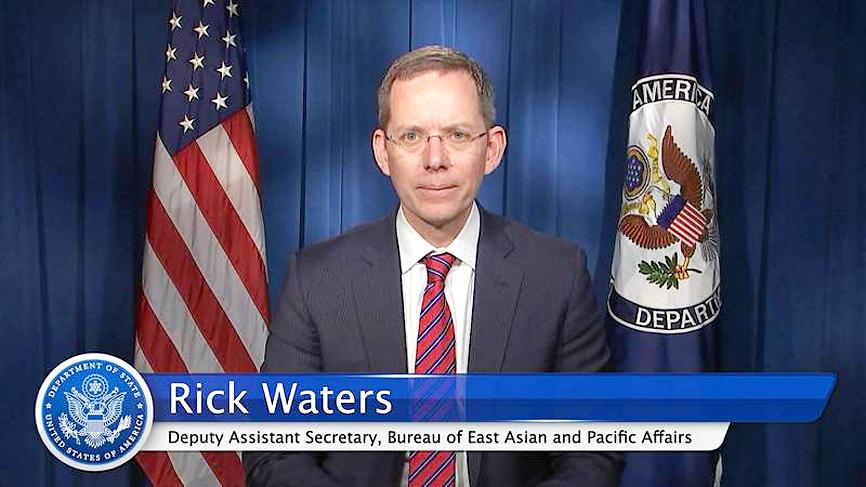Washington’s top Taiwan affairs official last week affirmed Taiwan’s “leading role” in the global high-tech industry during a forum on bilateral business collaboration.
Continued development of trade relations between Taiwan and the US would strengthen supply chain resiliency in response to the Chinese economic threat, US Deputy Assistant Secretary of State for China, Taiwan and Mongolia Rick Waters said in a recorded address in Columbus, Ohio, on Wednesday.
Waters was speaking at the Taiwan-US Business Roundtable Forum in the Midwest, held for the first time in Ohio.

Photo: Still frame grab from the recorded speech
Themed “Innovation and High-tech Global Supply Chains,” this year’s edition of the forum was jointly organized by the Taipei Economic and Cultural Office in Chicago, JobsOhio, the Ohio Chamber of Commerce and the Taiwan Trade Center of Chicago.
Considering Ohio’s importance in manufacturing and the automobile industry, participants in the two panels discussed high-tech supply chains and how to enhance economic partnerships on innovative technologies such as chip design and electric vehicles.
In attendance were Representative to the US Hsiao Bi-khim (蕭美琴); Ohio Lieutenant Governor Jon Husted; US Representative Steve Chabot, who is a founding cochair of the Congressional Taiwan Caucus; Ohio Chamber of Commerce president and chief executive officer Steve Stivers; and a variety of business representatives.
Standing in for US Secretary of State Antony Blinken, Waters hailed recent developments in Taiwan-US trade cooperation, including the second Economic Prosperity Partnership Dialogue held in November last year and the resumption of Trade and Investment Framework Agreement talks.
Especially in light of Russia’s war in Ukraine, the need for like-minded partners such as Taiwan and the US to work together to address the dangers of authoritarianism is greater than ever, he said.
In his address, Stivers brought up Intel’s planned US$20 billion investment to make Ohio a regional hub for semiconductor manufacturing, a sector in which Taiwan is a top player.
Nations with similar ideals should work together to create mutual economic and technological benefits, he said, while other speakers called for Taiwan’s inclusion in the US’ proposed Indo-Pacific Economic Framework.

CHAOS: Iranians took to the streets playing celebratory music after reports of Khamenei’s death on Saturday, while mourners also gathered in Tehran yesterday Iranian Supreme Leader Ayatollah Ali Khamenei was killed in a major attack on Iran launched by Israel and the US, throwing the future of the Islamic republic into doubt and raising the risk of regional instability. Iranian state television and the state-run IRNA news agency announced the 86-year-old’s death early yesterday. US President Donald Trump said it gave Iranians their “greatest chance” to “take back” their country. The announcements came after a joint US and Israeli aerial bombardment that targeted Iranian military and governmental sites. Trump said the “heavy and pinpoint bombing” would continue through the week or as long

TRUST: The KMT said it respected the US’ timing and considerations, and hoped it would continue to honor its commitments to helping Taiwan bolster its defenses and deterrence US President Donald Trump is delaying a multibillion-dollar arms sale to Taiwan to ensure his visit to Beijing is successful, a New York Times report said. The weapons sales package has stalled in the US Department of State, the report said, citing US officials it did not identify. The White House has told agencies not to push forward ahead of Trump’s meeting with Chinese President Xi Jinping (習近平), it said. The two last month held a phone call to discuss trade and geopolitical flashpoints ahead of the summit. Xi raised the Taiwan issue and urged the US to handle arms sales to

BIG SPENDERS: Foreign investors bought the most Taiwan equities since 2005, signaling confidence that an AI boom would continue to benefit chipmakers Taiwan Semiconductor Manufacturing Co’s (TSMC, 台積電) market capitalization swelled to US$2 trillion for the first time following a 4.25 percent rally in its American depositary receipts (ADR) overnight, putting the world’s biggest contract chipmaker sixth on the list of the world’s biggest companies by market capitalization, just behind Amazon.com Inc. The site CompaniesMarketcap.com ranked TSMC ahead of Saudi Aramco and Meta Platforms Inc. The Taiwanese company’s ADRs on Tuesday surged to US$385.75 on the New York Stock Exchange, as strong demand for artificial intelligence (AI) applications led to chip supply constraints and boost revenue growth to record-breaking levels. Each TSMC ADR represents

State-run CPC Corp, Taiwan (CPC, 台灣中油) yesterday said that it had confirmed on Saturday night with its liquefied natural gas (LNG) and crude oil suppliers that shipments are proceeding as scheduled and that domestic supplies remain unaffected. The CPC yesterday announced the gasoline and diesel prices will rise by NT$0.2 and NT$0.4 per liter, respectively, starting Monday, citing Middle East tensions and blizzards in the eastern United States. CPC also iterated it has been reducing the proportion of crude oil imports from the Middle East and diversifying its supply sources in the past few years in response to geopolitical risks, expanding